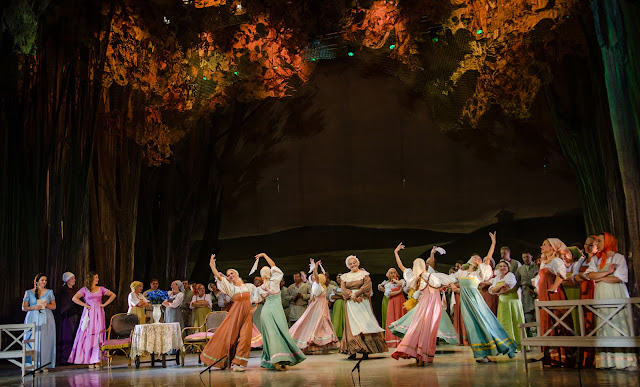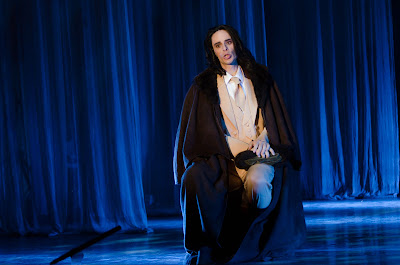 |
| Tchaikovsky Eugene Onegin, Act 1 - National Academic Bolshoi Opera and Ballet of Belarus at Birgitta Festival photo Heiti Kruusmaa |
Reviewed by Robert Hugill on Aug 20 2016
Star rating:
Fine singing transforms a rather staid production from Belarus at the Birgitta Festival in Tallinn
 |
| Vladimir Petrov - photo Heiti Kruusmaa |
Overnight, since the ending of Requiem... and before the previous night (see my review), the temporary theatre within the ruined church of the Pirita Convent had been re-cast as a traditional proscenium theatre with pit. The production was relatively traditional even to using a painted back-drop and suspended flats in a style which has rather gone out of fashion in the UK. But the results had an effective charm, especially when combined with the traditional but well thought out costumes, with the ensembles in each act forming attractive stage pictures.
 |
| Anastasia Moskvina, Oksana Volkova - photo Heiti Kruusmaa |
That mounting the production in such a short time was a challenge was indicated by some haphazard moments in the lighting plot. And the depth of the stage was clearly less than that in Minsk, as there was some awkwardness in fitting the choreography of the polonaise in Act Three to the new layout.
The overall production style was traditional too, not to say rather staid and old-fashioned with none of the detailed naturalism and personen-regie that we have come to expect in the West. Anastasia Moskvina's impassiveness as Tatyana in the first two acts rather made the character seem dim, and only Yuri Gorodetsky as Lensky created a sense of visual character; with his long hair (his own) and slight frame he looked every inch the fragile poet.
This was a performance which was all about the voices and musically there was very much that was superb.
 |
| Yuri Gorodetsky - photo Heiti Kruusmaa |
Vladimir Petrov cut a rather severe not to say mature figure as Onegin. Though he sang the role admirably he brought neither swagger nor seduction either to his demeanour or to his singing. For the first two acts this was an officer-like Onegin, almost as if Prince Gremin had got marooned in the wrong part of the plot. And in the crucial third scene of Act One, his attitude to Moskvina's Tatyana came over as rather too much the sever father. Petrov unbent a little in the climactic final scene, but it was difficult to see what drew Tatyana to him.
 |
| Ektaterina Mikhnovets, Anastasia Moskvina - photo Heiti Kruusmaa |
As I have said, Yuri Gorodetsky as Lensky was perhaps the most fully rounded of characters. He has a lyric voice with just the right amount of cutting edge, very much a Slav style lyric tenor. In the first act he made Lensky interesting and rather sexy, developing a petulance in Act Two. The climax was rightly a superbly phrased account of the Act Two aria, perhaps the high-point of the opera. Gorodetsky and Oksana Volkova as Olga did develop something of a believably youthful relationship. And Volkova's wonderfully dark mezzo-soprano voice contrasted wit her lively, almost flirty demeanour.
 |
| Andrei Valenty - photo Heiti Kruusmaa |
The smaller roles were all superbly sung with a balance to the casting which most opera companies would envy. Natalya Akinina and Ekaterina Mikhnovets made a well matched pair as Larina and Filippyevna. Akinina was a dignified Madame Larina, full of charm. Mikhnovets as Filippyevna was, I suspect, a lot younger than her role. The two blended nicely in the lovely opening quartet (with Anastasia Moskvina and Oksana Volkova off stage), and in the letter scene Mikhnovets was touching. Alexander Gelakh was a charming Monsieur Triquet, not as much of a caricature as in some performances. The strength of casting extended to Sergei Lazarevitch as Rotny and Dmitri Kapilov as Zaretsky.
The chorus was not highly mobile, they tended to take up a position and certainly hardly danced. The main dancing was done by the corps de ballet, with an impressive 24 dancers fielded for the ball. This division between a singing chorus and a dancing corps de ballet meant that the production's dance scenes lacked the important inclusive social element, but I understand that this division is typical of Russian productions of the opera. Musically the chorus gave no disappointment, singing with enthusiasm and lively tone. Within the performance parameters they were delightfully engaging, particularly in the opening act and were clearly full of enthusiasm.
 |
| Tchaikovsky Eugene Onegin - Belarus Opera at Birgitta Festival - photo Heiti Kruusmaa |
Despite my reservations about the quality of the amplified sound, it was a complete delight to hear an entire cast of native Russian speakers performing this opera. And the musical performance really transcended the sound limitations. Strong individual performances brought real vibrancy even though the dramatic style was a trifle stately and impassive.
Elsewhere on this blog:
- Mozartian music theatre: Requiem... and before at Birgitta Festival in Tallinn - Music theatre review
- Very funny indeed: Mozart's Le nozze di Figaro at Grimeborn Festival - Opera review
- Pilgrimage to Santiago: Gabriel Jackson's To the field of stars - CD review
- A day in Reykjavik: Ponce, Piazolla and Icelandic song at Harpa - concert review
- Beguiling charm: Sullivan's complete incidenal music to Macbeth and to The Tempest - CD review
- Intriguing: Music for clarinet by Michael Finnissy - CD review
- Elegiac modernism: Richard Strauss's Capriccio at Santa Fe - Opera review
- Channelling Gone with the Wind: Gounod's Roméo et Juliette at Santa Fe Opera - Opera review
- Hollywood noir: Samuel Barber's Vanessa at Santa Fe Opera - Opera review
- Quirky combination: Haydn and Ligeti - Cd review
- Sylvan delights:Gounod's La Colombe at West Green House
- Home

.jpg)






%20Craig%20Fuller.jpg)


No comments:
Post a Comment